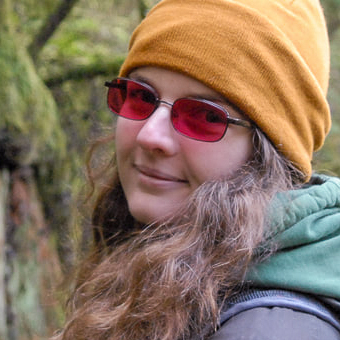Faith Jones

Research
In my current postdoc, I will explore how understory biodiversity in managed boreal forests can be most efficiently quantified. The project – the Key Performance Indicator project, is in collaboration with the forest company Sturo Enso, and aims to find efficient ways to monitor biodiversity in forests, thereby improving the effectiveness of industry measures to maintain and improve natural value.
Previously, I was postdoctoral researcher in Dr Elizabeth Wolcovich's lab at the University of British Columbia's Faculty of Forestry, where I studied climate change adaption and cold hardiness in wine grapes. I focused on the wine industry in the Okanagan Valley, BC, Canada, and enjoyed sharing my work with industry stakeholders to improve climate change adaption and agricultural practices.
My PhD the Biodiversity and Behaviour Group at the Centre for Biological Diversity, was at the University of St Andrews. I aimed to answer questions around global biodiversity change, macroecology and community ecology. My aim was to increase understanding of fundamental ecological processes and contribute to increasing knowledge for conservation purposes. I focused on long term, multi taxa, and analysis of changes in community structure using the BioTIME database.
Background
I graduated a Bsc(hons) in Applied Terrestrial and Marine Ecology at Bangor University, Wales, in 2014. During this degree I spent a year working at the Centre for Ecology and Hydrology in Bangor as a research assistant. I then completed a PhD at the University of St Andrews in 2019, focusing on assessing global patterns of biodiversity change. Between 2019 and 2022 I was a postdoctoral research fellow at the University of British Columbia, Vancouver, Canada, where I researched the effects of climate change on winegrapes. Now I am a postdoctoral research in the Restoration Ecology competence group at Umeå, researching biodiversity in managed boreal forests.
Selected publications
Jones FAM, Bogdanoff C, Wolkovich EM (2023). The role of genotypic and climatic variation at the range edge: A case study in winegrapes. American Journal of Botany, e16270.
Gotelli N... Jones FAM et al. (2021). Estimating Species Relative Abundance from Museum Records. Methods in Ecology and Evolution, 00:1–13.
Santini L,....Jones FAM et al. (2021). The interface between Macroecology and Conservation: existing links and untapped opportunities. Frontiers of Biogeography, 13.4, e53025.
Jones FAM, Dornelas M, Magurran AE (2020). Recent increases in assemblage rarity are linked to increasing local immigration. Royal Society Open Science. Royal Society Open Science, 7(7).
Jones FAM, Rutherford M, Deacon AE & Magurran AE (2019) Quantifying regional biodiversity in the tropics: a case study on freshwater fish in Trinidad and Tobago. Biotropica, 51, 700–708. DOI: 10.1111/btp.12692.
Jones NAR, Spence R, Jones FAM, Spence-Jones HC. Shade as enrichment: testing preferences for shelter in two model fish species (2019). Journal of Fish Biology, 1:5. DOI: 10.1111/btp.12692
Jones FAM, & Magurran AE (2018) Dominance structure of assemblages is regulated over a period of rapid environmental change. Biology letters, 14(6), 20180187.
http://dx.doi.org/10.1098/rsbl.2018.0187
Dornelas M, Antao LH, Moyes F, Bates AE, Magurran AE, Adam D, Akhmetzhanova AA, Appeltans W, Arcos JM, Arnold H, Ayyappan N, ... Jones FAM, ... et al. (2018). BioTIME: a database of biodiversity time series for the Anthropocene. Glob. Ecol. Biogeogr, 27(7), 760-786. https://doi.org/10.1111/geb.12729
Deacon AE, Jones FAM, & Magurran AE (2018). Gradients in predation risk in a tropical river system. Current Zoology, 64(2), 213 -221. http://doi.org/10.1093/cz/zoy004